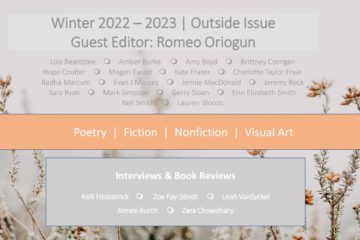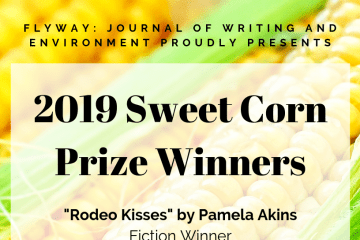Marilyn Kallet teaches poetry at the University of Tennessee. She is the author of countless poems, collections such as The Love that Moves Me (2013), and a children’s book, Jack the Healing Cat (2009). Her forthcoming collection, How Our Bodies Learned, is published by Black Widow Press and will be available January 2018.
How did the theme of the body inspire this collection? Did you write toward this theme, or did you see it slowly emerge in your poems?
I have always been one of those people who learn best through the senses, though I’ll admit I’m a late bloomer! When I turned fifty, I wrote a book of uncensored love poems, How to Get Heat Without Fire (New Millenium), 1996. I told myself if I wasn’t struck by lightning, I would write whatever I wanted to after that. In addition to the writing, I teach a poetry workshop every year in Auvillar, France, “O Taste and See: Writing the Senses in Deep France.”
For this current book, How Our Bodies Learned, the impact of tainted water came to me not through the media or books, but through sludge that came out of our own faucet on Blueridge Drive. Previously, whenever I heard news about Flint, I would say to myself, “Thank God it’s not us!” Jewish tradition tells us that we’re not supposed to thank God for hardship happening to our neighbors, and not us. I had to learn about the vulnerability of our water supply in an immediate, visceral way. And then I started reading more about the terrible trials of the citizens in Flint. I began to think more about “environmental justice.” Poor people, people of color, more often contend with environmental hazards than white middle class groups. No surprise there.
Through the body, I learn and report. Sometimes it takes a direct hit or a nearby explosion to get me to the subject matter, to the truths I need. The body is a source of for love as well, of heaven and hell on an intimate basis. “Big Love” is one poem in the new collection that takes the mortal journey from the depths back up to awe and wonder.
How do you explore the connection between the body and environmental travesties, such as the Flint water crisis, in your work? Concerning the interaction between the body and the environment, what mark do you see these entities leaving on one another?
The environment is part of the body, though we don’t always realize how close the connection is. Days when the air is troubled in Knoxville, we remember. Or when our water turns brown.
The title poem is about that tangible experience of water, “How Our Bodies Learned About Flint.” I quickly realized that the love poems also gathered around the theme of “How Our Bodies Learned,” in a positive and hopeful way. Other poems in the collection deal with gun violence and terrorism (I was in Paris during the November 2015 attacks). The day after the bombs and guns, poets gathered at Delaville Café to give a reading. Parisians, Americans, Brits and Canadians gathered, leaned in to hear something that made sense in response to the senselessness. I will keep trying to make sense, even if sometimes I have to start off with baby talk. One of San Bernardino “anti-bullet” poems is written from the point of view of a baby.
When writing about topics that are not specifically your lived experience, what research do you undertake to ensure the integrity of the stories you tell?
As to research: The main research project of my adult life has been about the Holocaust, and how that history connected to my family in Southwest Germany. The subject found me. My mother left a photo of herself and two elderly gentlemen, with the note: “The Nazis got the others.” What others? I went to the Holocaust Museum library in 2003 and started my research. Went to the German town in 2004 with my sister, daughter and niece, to talk with villagers about what had happened there. While in Horb, I found a personal journal with an entry about the morning the Nazis took away the children in my family. Prior to that, I was under the illusion that all the children had escaped. I also saw the visceral evidence of the Nazi plunder. In the doorposts of Jewish houses, there were hollows where the mezuzahs had been lodged. I wrote a poem about that, in Circe, After Hours, reprinted in Packing Light: New and Selected Poems. One family member, Hedwig Schwartz, survived. She was crippled before the Holocaust, fell off the transport car, and was taken by a good Samaritan to the hospital in Stuttgart. My family and I went to Marienhopital in Stuttgart to thank the nuns there for the care their group had shown my great-aunt during the war.
I tell you all this because I could not have seen or written about this subject without traveling to the area and interviewing people. The research continues into the Holocaust, in France, this time, as each year I go back to SW France I receive more stories.
How does this relate to the most recent volume? From the Holocaust research I learned that sometimes writing poems about issues brings a poet’s work closer to journalism than to any kind of “pure poetry.” We research, listen, bear witness. I am not living in Flint, but I am living in the body in Knoxville, Tennessee, and I am alert to the all the privileges of my zip code. I use the collage effect in the title poem, learned from taking oral histories in Germany and in Poland. For the facts about Flint water and the local government corruption, I mainly relied on CNN’s reporting. CNN has been consistent about tracking the story as it unfolds over time. Full disclosure: my daughter has worked as an editor at CNN.
As a writing professor, is there a specific poem or collection that you consistently enjoy assigning your students?
I always assign Lucille Clifton’s book, Blessing the Boats, to my beginning writing students. Her poems are both songs and histories. She writes about race brilliantly, personally. Clifton had six children, four of them in diapers, when her first book came out. She was one of my best and most beloved mentors. The last thing she said to me, the year before she died, was, “Marilyn, isn’t there something I was supposed to do for you?”
Do you have a favorite underrated writer? Someone people should be reading but maybe haven’t encountered on strolls through Barnes & Noble?
Some of my favorite writers are underrated just because they are young and unknown as yet. Among these, Bobby Caudle Rogers has to be one. He has recently found some prominence with his L.S.U. book, Social Histories. I am also in love with the poems of Alice Friman. She has many books out, a new one just accepted by L.S.U. Press. Her last poetry volume was The View from Saturn. Anything by her!
What is the most valuable purchase you’ve ever made as a writer?
Most valuable purchase? Not a thing, but an experience. When Heather was little, I went to the artist colony, the Virginia Center for the Creative Arts, on a regular basis. I wrote most of my poems there, in Sweet Briar, for several years. About twelve years ago VCCA acquired some property in Southwest France, in Auvillar, and invited artists to apply as individual fellows. I went to work on poems, fell in love with the village, and asked about teaching a workshop there. This spring will be my tenth year of offering the workshop!
The first day I arrived in Auvillar, in 2007, I spotted a white-haired gardener working next door. I introduced myself and asked him what the war years were like there. Were there any Jews in Auvillar? Yes, he told me, Dr. Hirsch was taken by Mengele to work on experiments, his son ran passports for the Resistance, his wife Berthe, 37, was taken to Auschwitz, and the two children were hidden by the villagers. That was the opening conversation!
Lastly, my favorite question from The New York Times “By the Book” series: If you could require the president to read one book, what would it be?
The President might resist poetry. I think reading Joy Harjo’s memoir, Crazy Brave: A Memoir, 2013, would be a good place to slip in poetry and consciousness-of-others through prose. It’s a compelling read by a prize-winning Muscogee poet, who would also be my top choice for U.S. Poet Laureate. Or I could point the President to Scott Momaday’s poetry-as-prose, The Way to Rainy Mountain. That book received the Pulitzer in 1969, and is readable by even the youngest readers. It has amazing drawings, too. This book opened the door for generations of Native American writers after. It exudes the power of the word, the importance of family, tribe, environment, and the interconnectedness of all things. The Diary of Ann Frank would also be a choice read for this president.
About the interviewer: Shelby Rae Stringfield graduated from the University of Tennessee with a BA in English and creative writing, having served as the editor-in-chief for the undergraduate literary magazine Phoenix. Currently, she is working to obtain her MFA at Iowa State, where she teaches composition and creative writing and serves as a fiction editor for Flyway.



